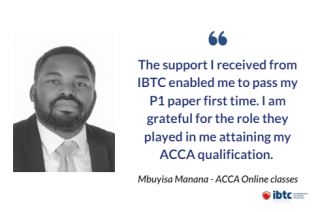ACCA students, we know how to help you pass first time
Key takeaways
We stand and fall by our ability to get you to pass first time. We're so confident that you will pass the ACCA Exam first time that you can come back for free if you don't. Our secret lies in our student support, study guides and question practice. By following a few simple guidelines, you can make our promise work for you. With over 10 years' experience in preparing students for their exams we have learnt a lot about study techniques. We've seen what works and what doesn't.Using our expertise we have developed a formula - a so called secret sauce if you will - that gives you the best chance of a first time pass. If followed correctly we really believe you will pass first time. In fact, we're so confident in this belief that you can come back for free if you don't pass. This is our Pass Assured Promise (PAP) and it's available to all our students. We are so obsessed with passing that our pass rate is the key measure of our business. Our CEO, Nikki Maritz, illustrates this when saying,"Our pass rate is the number we are all chasing. It's even more important than our revenue figure.
We believe that you buy a pass from us, not a product."
So ,with that said, what's in the secret sauce?
The secret lies in the fact that no other college offers more question practice and student support than IBTC. Question Practice We strongly believe in the power of question practice and we find any excuse to talk about it. According to a study published in The Guardian, "Researchers found that students who did a practice test after a period of revision did better on the final exam than those students who spent their time only on revision."The beauty of question practice is that it reinforces what you've learnt while helping you to identify your weak spots. It shows you where you need to focus.
Taking this a step further at IBTC we believe that the number of times you test yourself and the variety in your question practice is the real key to exam success. For best results you need various levels of question practice during your study process and the more you do, the better your chances of passing first time. We encourage our students to spend 60% of their time studying and the remaining 40% practicing. Study Plan The IBTC Study Plan lays it all out for you. It indicates when to go through your theory and when to do question practice.
It is designed to get you exam ready as quickly as possible.
Your Study Plan will provide you with what to study and for how long so you don't waste your time studying the wrong thing. Think of it as the road map for your ACCA journey. It will get you to your destination as quickly and successfully as possible. Hand holding We understand that you are human and sometimes all you need is a listening ear or a little motivation and a push in the right direction. This is why we walk your study journey with you.
We checkup on you regularity to make sure that you're staying on track. We notice when you a miss a deadline and we find out how we can help you make sure that doesn't happen again. Your success is our priority.
Business success is a journey - Leadership is the compass
By Annelize van Rensburg, director at Signium Africa www.signium.co.za
Leadership identification and development continues to be one of the most pressing business issues keeping executives awake at night. Every business has the same aim: success and sustainability. Established routes to this destination include competitive advantage, new technology to improve productivity and product innovation, and cost reduction to secure pricing efficiencies. Without superior leaders, none of this is possible.Companies progress through a life cycle from seed to start-up, growth to established, expansion to mature, and then to decline and exit, or renewal through invention.
In the same way, leadership identification and development progresses through a cycle.Leadership consulting offers the most suitable answers to these current dilemmas by helping leaders to align their people strategy with their business strategy; providing scientific and objective information through assessments; designing development interventions to help leaders function at their highest potential; and then embarking on acquiring and retaining leadership talent when talent needs to be acquired and not ‘home-grown’.In order to remain competitive and relevant, business leaders must start by aligning their talent strategy with their business strategy. This is critical because talent strategies translate the company’s vision and values into expected employee behaviour and define how they will contribute towards the company’s success. Misalignment is likely to result in strategic goals not being met.
It is a myth that only large organisations need a talent strategy. Smaller organisations are more at risk because there are fewer possible successors in unique roles.In addition, not only is it important to understand the current talent pool within the company but also future needs. This is done by analysing the readiness of the current leaders to meet the future business needs of the organisation and provides a realistic pipeline of leadership talent.Plan your talent for five years from now and not only for today; look to the future of the company. Use competency assessments to test employees’ long-term strategic thinking ability, innovation, as well as their flexibility in decision-making, because these are critical skills for building a successful business.Assessments are an objective and scientific way of gathering insight into a person’s current functioning and future potential. They provide an understanding of the impact of the person’s behaviour on others in the workplace.
If the assessment tools used are valid, reliable and culture-fair, and if assessments are professionally conducted, the insights are extremely useful.Most leaders are built, not born. Top performers take responsibility for developing their knowledge, skills and competencies. There are many ways of doing this, including leadership development programmes, on-the-job training and executive coaching, which is a powerful way to provide support to leaders and help them navigate current and future challenges.
Executive coaching can help turn good leaders into great ones.If leaders within the company are not yet ready or fully developed, leadership needs to be acquired, preferably with the assistance of a reputable headhunter or talent-search professional for those executive level positions.That suitable candidates can be found from outside the company’s industry is beyond doubt; they may even have an advantage over industry insiders.
Their advantage is the ability to ask embarrassing questions while taking nothing for granted. Successful cross-industry movers acknowledge that their first job is to listen, then listen some more. The reinvigorated executive team around the new leader stops making assumptions and starts to question old habits. They may also acknowledge that new technology, new legislation and the emergence of a new consumer are having major impact on their sector. There are no guarantees of success, however. Outsiders don’t always work miracles.Pros are accompanied by cons.
The ‘safe’ industry insider does not have to go through a period of intensive familiarisation with a new industry and its dynamics. He or she can hit the ground running. In contrast, the outsider faces a steep learning curve. Suddenly, evolution seems safer than revolution. Continuity seems a better bet than a thorough shake-up.Stay open-minded.When recruiting leaders, don’t ignore the importance of diversity to balance your team. Remember generation, gender, race, religion and so forth. Businesses with diverse workforces will have a strategic advantage in the marketplace.It is difficult to attract executive talent. It is easy to lose executive talent.Offering opportunities to grow and giving leaders room to express themselves remain key to executive retention.
This is according to Michelle Moss, director of Leadership Assessment Consulting at Signium Africa.There are also other ways business leaders can meet their employees’ needs and foster employee satisfaction to support retention.Give them the permission to dream up new ideas and different ways of doing things. Of course, the boss still needs to keep a bird’s eye view of what is going on and provide advice and guidance whenever necessary to ensure ultimate success.Make work meaningful because most employees want to identify with the vision, the mission and the goals of the company they work for. As business leader, make sure that these are communicated often and that all leaders walk the talk.
Pay your employees what they are worth. Reward and recognition is still critically important in the workplace. A fair trade is important to most people.Business success is a journey, leadership is the compass. Leaders should develop talent strategies for the right reasons, and not just to tick a compliance box. It is worthwhile remembering that we are dealing with individuals who should be esteemed in the workplace.
A leader is a dealer in hope – Napoleon Bonaparte.
* Annelize van Rensburg is a founder and director of Signium Africa, previously Talent Africa, a leading provider of integrated talent solutions and leadership development in sub-Saharan Africa, e-mail: This email address is being protected from spambots. You need JavaScript enabled to view it.



